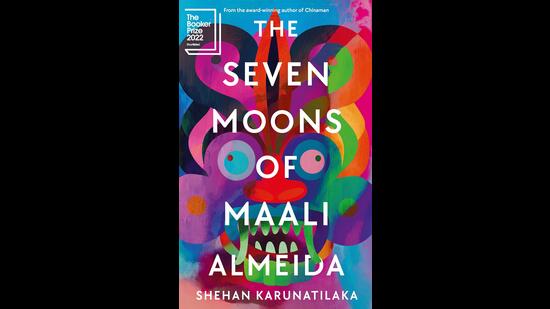Up until October, Sri Lankan writer Shehan Karunatilaka, 47, was quite content living the quiet life. Cocooned in his room at his Colombo home, surrounded by books and his stories, he’d spend most of his day talking to no one apart from himself and his characters. He’s an involved husband and parent to two kids and a freelance advertising professional, fitting writing into his life. It kept him only as busy as he liked. “It’s a good life, the usual life of a writer,” he says in a video interview.
That life has been dramatically upended after Karunatilaka’s second novel, The Seven Moons of Maali Almeida (2020), won the 2022 Booker Prize. The book is part thriller, part political satire, set in 1980s Sri Lanka. It follows a dead photographer over one week as he moves between the world of the living and the dead to solve the mystery of why he died. The story, bursting with his trademark mordant humour, weaves in the brutalities of the Sri Lankan Civil War. After his Booker win, he has been flooded with requests from publishers, agents, publicists and journalists from around the world.
“It’s strange that when you get some success, you’re expected to be a talker and a performer,” he says. “I know it’s a big deal and I’m glad the book is getting attention and will be read more widely than my previous works. That’s why you write. But you want the book to get attention and not necessarily yourself.”

Karunatilaka is the first native Sri-Lankan writer to win the coveted literary award. Sri-Lanka-born Michael Ondaatje, who picked up the 1992 Booker for The English Patient, has lived in Toronto, Canada, since 1962. Life after Booker is “one long litfest” South African novelist Damon Galgut, who won the prize last year for The Promise, told Karunatilaka when the two met at a literature festival recently. “You may not write another word, my friend,” Galgut warned him. “He was very kind, but he also looked very tired, so I think that’s the reality,” Karunatilaka says.
Meanwhile in Colombo, Karunatilaka’s calendar is full for the next two years. He’ll be travelling, talking about his work at book gatherings and literary events. And he’s hoping there will still be time to write. After all, Sri Lanka has several stories to tell. In his acceptance speech last month, Karunatilaka expressed hope that Sri Lanka “learns from its stories” and that his novel will someday be seen as a work of fantasy instead of a political satire.
It’s a long road ahead. The economic crisis has stabilised, but the nation’s problems are far from over. “The strange thing about Sri Lanka is that we are always hopeful,” the author says. “So, like every Sri Lankan, I am optimistic. We have to be. However, I have lived in this country for a long time, so I know that we have our horse drawn on hope.”
Weeks before the prize was announced, Karunatilaka released his third book, The Birth Lottery and Other Surprises (Hachette India). It’s a collection of 30-odd short stories he had written over 20 years for short story competitions. The tales draw on Sri Lanka’s history, myths and folklore. “I never got a commendation for them, nor was I longlisted for any short story award,” he says. “There were 5,000 entries for some of these awards; so, it’s all a lottery. All these prizes, including the Booker, are in the end a lottery.”
The writer is keen to get The Seven Moons… translated into both Sinhala and Tamil. His first novel, the self-published and acclaimed Chinaman: The Legend of Pradeep Mathew (2010), followed an alcoholic journalist as he tracked down a 1980s cricketer. It regularly features on lists of best cricket books, best books from the Commonwealth, and best first novels. It was translated into Sinhala in 2015. “We should be telling our stories in all our languages,” he says.
Alongside, Karunatilaka hopes that the Booker buzz won’t get in the way of his writing. He recently wrote the screenplay for 800, the upcoming Tamil biopic of cricketer and coach Muttiah Muralitharan. He’s working on his third novel. “It will be about Sri Lanka; there won’t be ghosts or wars or cricket or any of the subjects that I have already exhausted.” There are also screenplays and children’s books in the works. “I’ll have to juggle those things. Let’s see how far I get,” he says.
A part of him is hankering for solitude. Once the dust has settled on his win, Karunatilaka is hoping to return to the world of his room, coming up with ideas, writing, reading and talking to himself. “That’s the thing I’m best suited to doing,” he says.
Enjoy unlimited digital access with HT Premium
Subscribe Now to continue reading

Stay connected with us on social media platform for instant update click here to join our Twitter, & Facebook
We are now on Telegram. Click here to join our channel (@TechiUpdate) and stay updated with the latest Technology headlines.
For all the latest Art-Culture News Click Here
